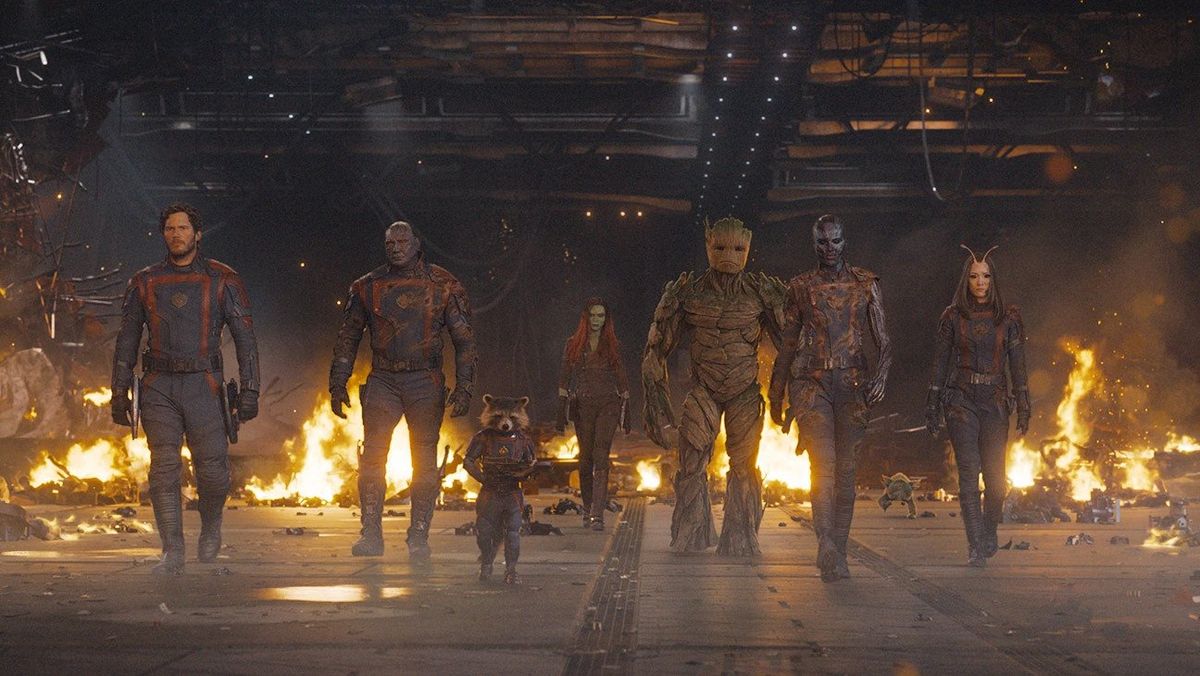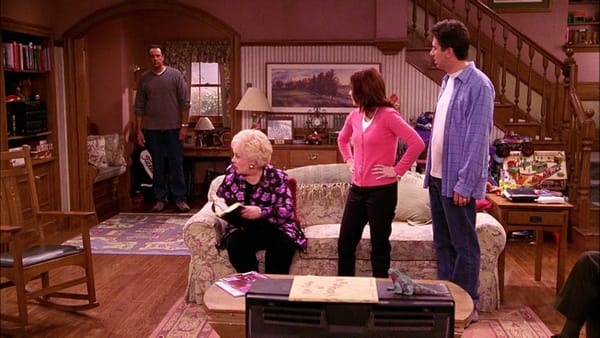The Trauma Plot and the Abuse Plot

More than a few reviews of director James Gunn's Guardians of the Galaxy, Vol. 3 damned it with faint praise along the lines of "This is as close as a director in the Marvel Cinematic Universe can get to making a personal statement." Usually, these reviews were positive, but it wasn't hard to sense the argument around the edges: James Gunn can get away with making a personal film within the Marvel system because he's a grunge-soaked auteur, in love with gross-out gags and pop music cues; most other directors can't.
I suspect this is true in the abstract – it is, after all, very hard to turn any blockbuster film into a personal statement these days – but I'm not sure it's true in the particular. Yes, Gunn's great skill at bodily fluid pop fantasias sets him apart from other Marvel directors in a way that is immediately obvious on the surface. But when you dig down into the meat of the Guardians films, they've provided the template for much of what Marvel has made since the first one was released in 2014: A hero weighed down by a traumatic past forms bonds with other characters and overcomes that past with their help. Usually, the third act involves punching a representation of the trauma right in the face.
In theory, then, these movies should seem largely like other Marvel films. Yet watch a movie like Guardians 2 or 3 and stack it up against something like the 2021 film Black Widow, which has a similar (if necessarily earthbound) story arc, and it becomes apparent that whatever Gunn has tapped into runs deeper than his arch comedic sensibility. So what is that?
The answer might lie in the genre where Gunn got his start: horror.
The 2018 legacyquel version of Halloween, directed by David Gordon Green and written by Jeff Fradley, Danny McBride, and Green, takes an idea with a mythic power and tries to push beyond that into something even more archetypal. John Carpenter and Debra Hill's 1978 Halloween did more than any other film to popularize the slasher subgenre, and it largely holds up today. It also explicitly paints killer Michael Myers as the boogeyman, a force who doesn't have motivations or needs. He just is, and he will kill you.
Famously, that film has a final girl – Laurie Strode, played by Jamie Lee Curtis. In 2018, Curtis returned to the role for the fifth time, in a film that posited that none of the myriad sequels to the first film were "canon." Instead, Laurie had spent her life marked by the events of 1978, waiting for Michael to return to her, as if she knew she was the star of a slasher franchise in an alternate timeline. Laurie lives in the woods, and she's gone hardcore survivalist. She knows Michael is going to come back, and she knows she's the only one who can stop him. Would you believe she's right?
On the press tour for that film, Curtis said that the movie was "about trauma" so often that it became a minor meme, especially among horror fans. And if you've been paying any attention in the last five to 10 years, you've gotten used to hearing that a thing is "really about trauma." If you are someone who struggles with CPTSD or who has a traumatic incident that lives in their body and brain, who then tries to express some of those ideas through art (as I do), the reduction of these concepts to marketing buzzwords can really stick in your craw.
I want to be clear: There's nothing wrong with making art informed by trauma. Indeed, its creation is worthwhile and necessary and often a huge part of the healing process. But at some point, the people who sell these projects to the world at large and the people who write about them (including me at various points!) turned "this [x] is about trauma" into a phrase that can put some on the defensive. Oh, we think, here we go again.
I quite enjoy Halloween (2018), and it also serves as a textbook example of a "Trauma Plot." (A note on everything that follows: I'm using "Trauma Plot" in a fairly narrow sense and mostly to talk about film and TV. The interiority of realistic fiction scrambles a lot of what I'm about to talk about below. For a deeper consideration of the Trauma Plot in fiction as a whole, check out Parul Sehgal, from whom I got the term "Trauma Plot," and Brandon Taylor.)
In mainstream film and TV, the Trauma Plot unfolds thusly: A character with a dark past where Something Bad Happened lives in the shadow of that past, often overtly so, where they are completely cognizant of the way that darkness infects them even still. (Occasionally, the character won't remember what happened to them, but it will slowly come back to them across the course of the film. My favorite example of this is The Matrix Resurrections.) The return of the dark past will cause them to lash out at others, at the world at large, at themselves, and at the end of act two, it will seem that the darkness has won. But wait! Here in act three, a chance at redemption! Now, Laurie can lure Michael to her cabin and duke it out with him, in a visceral fight that stands in for her defeating her capital-T Trauma. The story acknowledges that the weight of trauma never goes away, but since it has been symbolically defeated, an attempt at healing can be made. At least until the next sequel.
Onscreen, the Trauma Plot almost always exists in a larger-than-life genre simply because it necessitates creating a version of Trauma that can be physically defeated. Could you do a realistic Trauma Plot about, say, a sexual assault victim tracking down the person who hurt them and making the assailant pay? Yes. In fact, it's been done many times. Yet the closer the Trauma Plot gets to reality, the more disquieting it becomes to contemplate, and the more that it starts to tilt into the Revenge Thriller, a genre that asks who gets to determine what justice looks like. See also: Promising Young Woman, which, whether you love or hate it, offers a vivid example of how hard it can be to siphon The Trauma Plot into a realistic milieu.
There are a lot of different ways to construct this type of Trauma Plot, but at its core, it is about quite literally defeating one's Trauma, usually through a gradual leveling up to the final boss battle. The Trauma Plot aims for resolution over rumination, catharsis over consideration. The best Trauma Plots know that fixing one's dark past isn't as easy as punching it in the face, but punching it in the face sure doesn't hurt. There is a triumphalism to the form, and at its best, it can make survivors of even the worst things humans can do to each other feel empowered.
But I don't think James Gunn is constructing Trauma Plots.
The big American horror "story" of 2018 – insofar as a horror movie crossed over from cinephile circles to more mainstream fans – was Ari Aster's debut film Hereditary. Incredibly funny, deeply terrifying, and full of discombobulating twists and turns, Hereditary provoked a lot of love and at least a little passionate hate. Aster's career is now three films deep, and he might be my favorite young American filmmaker currently working. I'm not sure I'd like him this much if he wasn't actively enraging more than a few people as well.
Even though it came out five years ago, Hereditary is still the kind of movie I try not to spoil, so I'll endeavor to keep what follows vague. The smartest thing Hereditary does is graft a very specific type of horror movie onto a dysfunctional family movie in the vein of Ordinary People. The heightened situations and emotions of Hereditary allow for some incredibly dark comedy, but the basic tropes are the same. When Toni Collette, as a family matriarch who has had it, chews out one of her children over dinner, the scene is somehow terrifying, campy, and mesmerizing all at once.
By melding genres in this way, Hereditary is able to create metaphors that cut in both directions. At its deepest, most subterranean levels, most horror is about how human beings process (or don't process) traumatic incidents, and the dysfunctional family movie is typically about a family struggling through something, hurting each other along the way, before finally reaching some point of catharsis. Both of these are Trauma Plots, on some level, but by wedding them together, Hereditary is creating something else entirely – a story not about how Trauma can be defeated or even outlasted but about how it endlessly replicates itself. By the end of Hereditary, it is implied that some truly dark stuff has happened over and over again. We have just watched one specific cycle. But there have been many before, and there will be many after.
All three of Aster's movies play in this sandbox. They are about the ways that parents scar their children, sometimes without meaning to, and they all feature families or family-like structures that are rife with hierarchies in which abuses of power aren't just likely but perhaps inevitable. The family in Hereditary, the cult in Midsommar, and the corporation in Beau Is Afraid are all structures that cause pain and suffering to trickle down.
Aster's films are usually written about in terms of generational trauma, and he's clearly dealing with that. But he's not just writing about the generational trauma itself. He's also interested in its replication, in the cycles that enmesh his characters and drag them down. If there's an opportunity to break the cycle, it usually only leads to deeper horrors. His characters are damned by the circumstances of their birth, trapped from the moment they emerge into the world.
These aren't Trauma Plots. They're Abuse Plots. And that brings us back to James Gunn.

So just what is an Abuse Plot and how does it differ from a Trauma Plot? I'm still figuring that out myself, especially as the two filmmakers I'm using as examples in this piece – Ari Aster and James Gunn – are wildly different figures. Yet in the Guardians movies, essentially every character has an abusive father figure whose grasp they are trying to escape. Nevertheless, their Abuse Plots suggest abusive cycles can be alleviated if not broken, while Aster's movies suggest the opposite. So while I'm just scratching around the very edges of something I don't have entirely figured out yet, I do think I'm onto something, which is why I'm writing this.
Outwardly, the Trauma Plot and the Abuse Plot have a lot in common. They are both about bad stuff that has hurt the characters in the past and the characters being forced to confront that bad stuff anew. Occasionally, as in the Guardians movies, the dark past is personified in the form of a villain who can be physically bested, in the same fashion as in the Trauma Plot.
I would argue the difference lies in temporality. The Trauma Plot is often singularly focused on the past, which is where the Trauma lives. Yes, it might still be affecting Laurie Strode here in the present, and it might have driven away her daughter and granddaughter, but the focus is very much on the singular bad event in the past. The Abuse Plot can offer a traditional series of flashbacks to The Bad Times – as when Guardians 3 shows us Rocket Raccoon's deeply upsetting origin story – but its focus outside of those scenes is much more on the present. We have to get Rocket's backstory via flashback because he doesn't want to talk about it. What happened to him has made him surly and untrusting. Do you need to know more than that?
The Trauma Plot at its worst uses Trauma as a get out of jail free card for a character's bad behavior – the classic "yeah, they killed everybody, but that's because someone made fun of them when they were a little kid" bit. The Abuse Plot understands that every bad and harmful act, no matter how minor, continues the cycle of abuse the character is trapped in. Whether we're talking about the family in Hereditary visiting literal horrors on each other or the sisters Gamora and Nebula in the Guardians movies snarling at each other, the focus is on the actions in the moment. Yes, we understand that being raised by Thanos, the ultimate abusive dad, might leave one a bit aggrieved. That's no excuse for treating someone like shit, because treating someone like shit more likely than not gets replicated somewhere downstream.
If an Abuse Plot ends with catharsis, it's usually in the form of a cycle being broken in some small way. One of the smartest things Guardians 3 does is wed its Abuse Plot framework to a Trauma Plot resolution, which allows Rocket both a Marvel-friendly (Trauma) plot catharsis, in the form of a villain to best, and a quieter, more earned character catharsis over on the Abuse Plot side of the ledger.
I would also suggest that the Abuse Plot is easier to port over into more realistic genres, at least onscreen, simply because we all live in the world and have observed abusive power dynamics in our lives by looking out the window. In film and TV, the Trauma Plot all but requires a conflation of internal and external stakes; the Abuse Plot is a bit more forgiving.
(I also would guess that Trauma Plots are better suited to bounded narratives and Abuse Plots to longer-running stories, but there are plenty of good Trauma Plots on TV, and I just talked about how Ari Aster's movies are great Abuse Plots. So. Grain of salt.)
I'm not writing this to say the Trauma Plot is bad or deficient in any way. I think it can be enormously effective when deployed well, as in, say, the 2022 film Resurrection, which offers the kind of bloody catharsis the Trauma Plot so rarely gets. But if not handled well, the Trauma Plot also allows for too-easy solutions to thorny, complicated problems.
The Abuse Plot is slippery, harder to pin down, but for my money, incredibly rewarding when done well. And since not all of us have suffered intense, painful, horrible traumatic incidents in our pasts but basically all of us have suffered the cyclical repetition of those traumas via abuses of power big and small, the Abuse Plot just might be about as old and universal a storytelling form as we've got.
After all, she said, 2,500 words into this article, you know what has a pitch-perfect Abuse Plot? Hamlet.
Consider becoming a paid subscriber: Running this newsletter is absurdly expensive, and by becoming a paid subscriber, you'll both help keep the newsletter online and keep posts like this free for those who can't afford to upgrade. But you'll get other stuff, too! Paid subscribers get access to comments, weekly discussion posts, and occasional other special posts and features. I'm also working on setting up a Discord for subscribers, and maybe there will be some other fun treats along the way. Click the button to learn more!
Three things: Here's some stuff I've been into this week!
- Are you watching Silo? The first season of the AppleTV+ series brought me a lot of joy, and the last few episodes offered some terrific twists. It's also about a bunch of people who live in a (you guessed it) silo, and it's the only TV show with the guts to take the obligatory seventh episode about a supporting character and turn it into the pilot. The whole first season is available now.
- Can I recommend something that I wrote in this new feature? I don't see why not! I wrote this feature for LGBTQ Nation on the children of queer parents seeking out biological relatives, and I think it turned out really well. Sample quote: “I was raised with the philosophy that blood doesn’t matter. I’m not related to three out of my four parents at all, so the philosophy was always nurture over nature, 100 percent,” Carianna said. “When I met my half siblings, it’s not that I realized that was wrong because I don’t think it was. There’s just a connection to them that is undeniable. You look across the table, and you see someone you’ve met for the very first time, and they have some mannerism or they say something a certain way, and there’s this flash of recognition. You’re just, like, ‘Oh, this person I’m meeting is my sister.’”
- Tess Gunty's novel The Rabbit Hutch knocked my socks off. I'm not sure the ending of it entirely tracks, and it frequently bites off more than it can chew. But the experience of reading it was so overwhelming that I just didn't care. If nothing else, check it out for a lengthy chapter about an unhealthy relationship that develops between two characters.
This week's reading music: "Sprinter" by Torres
Next time: Across the Spider-verse isn't half a movie! How dare you suggest such a thing?




